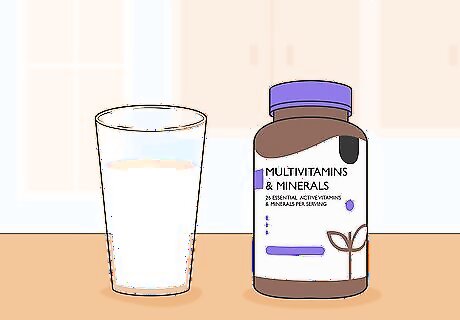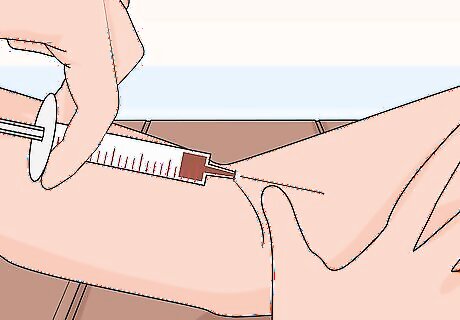
views
X
Research source
Correcting and Preventing Vitamin A Deficiency

Eat meat, poultry, fish, dairy and animal products for preformed vitamin A. Because your body doesn't have to convert preformed vitamin A, this type of vitamin A can more quickly correct a vitamin A deficiency — but don't overdo it. A single serving with each meal is plenty. Foods with preformed vitamin A include: Beef liver Pickled herring Fortified milk and cheese Eggs Sockeye salmon Tuna Chicken

Consume plenty of leafy greens and brightly-colored vegetables. Yellow and orange fruits and vegetables, along with leafy greens, have a lot of provitamin A carotenoids, which your body converts into vitamin A. Of these provitamin A carotenoids, you likely recognize beta carotene as a nutrient that's good for your eye health. Try to include a serving of at least one of these fruits or vegetables at every meal. Fruits and vegetables that are rich in provitamin A carotenoids include: Spinach Carrots Cantaloupe Mangos Broccoli Summer squash Black-eyed peas PumpkinsTip: Try to get most of your vitamin A from carotenoids in fruits and vegetables. Although it's rare to get sick from consuming too much vitamin A, it's more likely to happen with preformed vitamin A than with carotenoids.

Take a daily multivitamin if you don't get enough vitamin A from your diet. Select a multivitamin with at least 2,500 IU (750 mcg RAE) of vitamin A. Although some commercial vitamins may contain more than the amount you need in a day, having too much vitamin A in your system isn't usually a problem, particularly if it comes from provitamin A carotenoids. Your vitamin A needs are based on your age and sex. The daily recommended amount is measured in micrograms (mcg) of retinol activity equivalents (RAE). Newborns up to age 6 months need 400 mcg RAE, babies aged 7-12 months need 500 mcg RAE, children aged 1-3 require 300 mcg RAE, kids aged 4-8 need 400 mcg RAE, kids aged 9-13 need 600 mcg RAE, teen boys aged 14-18 require 900 mcg RAE, teen girls aged 14-18 need 700 mcg RAE, adult men need 900 mcg RAE, adult women need 700 mcg RAE, pregnant teens need 750 mcg RAE, pregnant women need 770 mcg RAE, breastfeeding teens require 1,200 mcg RAE, and breastfeeding adults need 1,300 mcg RAE. Most of the vitamin A in multivitamins comes from provitamin A carotenoids, such as beta carotene. Check the label to determine how much of the vitamin A is preformed vitamin A and how much is provitamin A carotenoids.Tip: Pregnant women need extra vitamin A to support their own metabolism and encourage fetal growth and tissue maintenance. If you're pregnant, talk to your doctor about how much vitamin A you should have.
Seeking Medical Treatment

See an ophthalmologist for an eye exam. Since night blindness and dry eyes are two of the earliest signs of a vitamin A deficiency, an eye exam is also the easiest way to diagnose the condition. When you make your appointment, tell the ophthalmologist that you think you might have a vitamin A deficiency. They'll include light response and contrast tests with your eye exam. Vitamin A deficiency can also cause your eyes to become dry. If you have a problem with dryness, let the ophthalmologist know. They can prescribe rewetting drops to help while you're correcting the vitamin deficiency.

Get labs to measure the levels of vitamin A in your blood. If you go to a regular doctor, they'll likely take some blood so they can measure your levels of vitamin A and other nutrients. The blood tests help the doctor determine the best way to correct your deficiency. If you have a vitamin A deficiency, you likely have a deficiency of other nutrients as well, particularly zinc and iron. Your doctor will determine if you need to take additional supplements to correct other deficiencies.

Start a vitamin A supplement under medical supervision if necessary. If you have a severe deficiency, your doctor might start you on oral supplements of vitamin A. Typically this supplement consists of 60,000 IU (18,000 mcg RAE) of vitamin A for 2 days, followed by 4,500 IU (1,350 mcg RAE) per day until you are no longer deficient and the symptoms of deficiency have gone away. These doses are well above the daily recommendation for vitamin A, which is why medical supervision is necessary. Although vitamin A toxicity is rare, it is a possibility if you're taking large-dose supplements. Symptoms of toxicity include nausea, headache, fatigue, loss of appetite, and dizziness. If you experience these symptoms while taking a large-dose vitamin A supplement, let your doctor know immediately.Warning: Vitamin A supplements might put you at greater risk of developing lung cancer. If you smoke, tell your doctor how much you smoke and how long you've been smoking. Your doctor will evaluate your risk of lung cancer to determine if vitamin A supplements are safe for you.

Get help to stop drinking if you consume alcohol excessively. Chronic alcohol consumption interferes with your body's ability to convert provitamin A carotenoids to vitamin A and also depletes the stores of vitamin A in your liver. If you're concerned that you have a problem with alcohol, explore paths to sobriety with your doctor. You may drink regularly or excessively and not technically have an alcohol use disorder (alcohol dependence or alcoholism). However, you don't need to have an alcohol use disorder for your drinking to affect your health.
Recognizing Deficiency Symptoms

Evaluate your ability to see at night or in the dark. Not being able to see objects in the dark or seeing halos around lights can be troubling or even scary. Night blindness is also an early symptom of vitamin A deficiency, which can typically be corrected pretty easily. While you would need to see an ophthalmologist for official vision tests, you can check your ability to see contrasts at home. Night vision primarily deals with contrasts between dark and shades of gray. Download a contrast eye chart at https://www.allaboutvision.com/eye-exam/contrast-sensitivity.htm to test your eyes in a well-lit area. While your printer may not be able to print the lower contrasts accurately, it will still give you a good idea if you're able to see the contrast between light gray shapes and white paper.Tip: If you live in an area where you have limited access to medical care, home testing can give you a good indication if you're suffering from night blindness and need to supplement your diet with vitamin A.

Examine your skin for unusual dryness or scaliness. If you're deficient in vitamin A, your skin will have a dry, scaly appearance. Your lips will also be dry, even if you drink a lot of water. You may also notice that your tongue looks or feels thicker. Even if you use lotion to moisturize your skin, you may still notice that your skin has a rash-like appearance because your hair follicles are clogged.

List any unusual infections you've had recently that could indicate a deficiency. A lack of vitamin A weakens your immune system, which can lead to infections that your body previously would've fought off. If you've had more infections recently than you normally have, a vitamin A deficiency could be to blame. For example, if you had a minor cut or scrape that didn't heal in a few days and later became infected, that could be a sign of a weakened immune system, which could be caused by a vitamin A deficiency. Persistent infections that don't respond to antibiotics, or recur after antibiotic treatment, might also indicate a deficiency.















Comments
0 comment